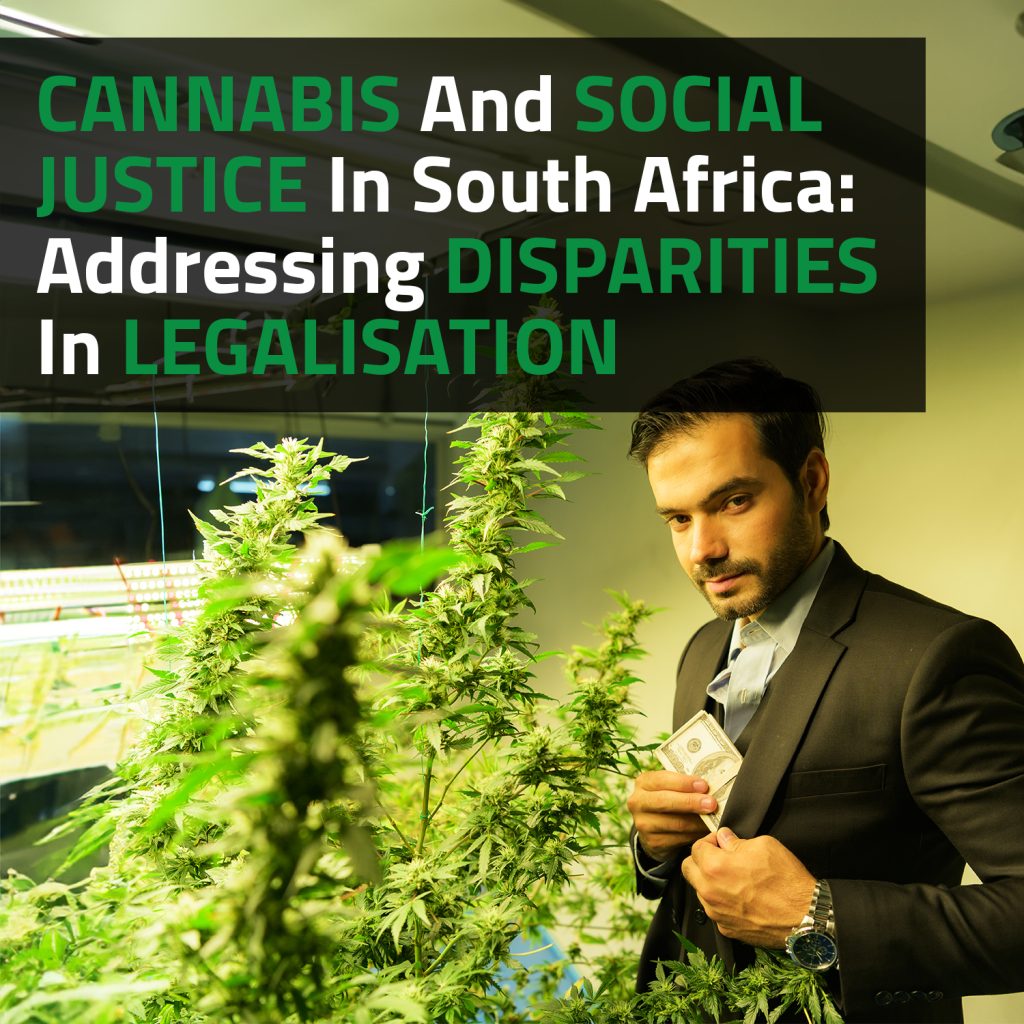In 2018, South Africa made headlines by legalising the private use and cultivation of cannabis by adults. This landmark decision marked a significant shift in the country’s cannabis laws. However, it’s essential to explore the nuances of this legalisation to understand its implications fully.
Historical Perspective
Cannabis has a rich history of traditional use in South Africa, often in cultural and spiritual practices. Historically, South Africa had strict laws against cannabis use, influenced by international drug control policies. Exploring the evolution of these policies provides insights into the roots of social disparities associated with cannabis.
The Impact Of Cannabis Prohibition
Cannabis prohibition in South Africa has had far-reaching consequences, particularly on marginalised communities. Understanding these consequences is essential for grasping the extent of the social disparities that have emerged over the years.
Economic Consequences
Cannabis prohibition disproportionately impacted economically disadvantaged communities in South Africa. Many individuals from these communities turned to the illicit cannabis market as a source of income due to limited job opportunities. However, engaging in illegal cannabis cultivation or distribution often led to criminal charges and imprisonment, further exacerbating their economic struggles. The prohibition also hindered the development of legal cannabis businesses in these areas, depriving them of potential economic growth and job creation opportunities.
Health And Well-being
Prohibition had negative implications for the health and well-being of marginalised communities. In many cases, individuals resorted to using unregulated, low-quality cannabis products due to limited access to legal alternatives. This posed significant health risks as the quality and safety of illicit cannabis were not guaranteed. Additionally, the stigma associated with cannabis use, driven by prohibition, led to mental health challenges and social isolation for users who felt compelled to hide their consumption.
Education And Opportunities
Marginalised communities often faced educational challenges linked to cannabis prohibition. Young individuals caught in possession of small amounts of cannabis could be subject to criminal records, limiting their access to educational opportunities and future employment prospects. This cycle of disadvantage perpetuated the existing social disparities by hindering the upward mobility of young people in these communities.
Racial Disparities
Cannabis prohibition in South Africa has played a significant role in perpetuating racial disparities. Historically, law enforcement disproportionately targeted Black individuals and communities for cannabis-related offences, leading to higher arrest and incarceration rates among Black South Africans. This racial bias within the criminal justice system not only created social inequalities but also deepened distrust between law enforcement agencies and marginalised communities.
Economic Disparities
The economic disparities resulting from cannabis prohibition are notable. While some individuals and criminal organisations profited from the illicit cannabis trade, these gains were often concentrated in the hands of a few. Meanwhile, marginalised communities were left to grapple with the negative economic consequences, including limited access to legal cannabis business opportunities. As a result, the wealth generated from the cannabis industry remained concentrated and failed to uplift disadvantaged areas.
Criminal Justice Disparities
Cannabis prohibition contributed significantly to criminal justice disparities. Individuals from marginalised communities were more likely to face arrest, conviction, and incarceration for nonviolent cannabis-related offences. This not only disrupted their lives and families but also perpetuated a cycle of disadvantage, as those with criminal records encountered barriers to employment, housing, and education upon release.
The Path to Legalisation
The journey towards cannabis legalisation in South Africa has been marked by significant milestones and the influence of public opinion and advocacy. Exploring these developments provides insights into the complex process of reforming cannabis laws.
What Were The Key Milestones Leading To The Legalisation Of Cannabis In South Africa?
| The 2017 Western Cape High Court Ruling | One of the pivotal moments in the path to cannabis legalisation was the landmark ruling by the Western Cape High Court in 2017. The court declared that certain provisions of South Africa’s Drugs and Drug Trafficking Act and the Medicines and Related Substances Control Act were unconstitutional. This ruling decriminalised the private use and cultivation of cannabis by adults, marking the first significant legal step towards broader reform. |
| The Constitutional Court Decision of 2018 | Following the Western Cape High Court ruling, the Constitutional Court of South Africa handed down a historic judgement in September 2018. The Constitutional Court affirmed the right to privacy and upheld the decriminalisation of the private use, possession, and cultivation of cannabis by adults for personal consumption. This decision had a profound impact on South Africa’s cannabis laws, effectively legalising cannabis for personal use in private spaces. |
| The Cannabis for Private Purposes Bill | In 2020, the South African government introduced the Cannabis for Private Purposes Bill. This bill proposed comprehensive regulations for the private cultivation, possession, and use of cannabis by adults. While it outlined the limits and conditions for personal use, it also set the stage for the legalisation of small-scale cannabis cultivation for personal consumption. |
How Did Public Opinion And Advocacy Play A Role In This Process?
Public opinion and advocacy have played pivotal roles in shaping the evolving landscape of cannabis laws and regulations in various parts of the world. In this exploration, we delve into how the voices of the people, combined with dedicated advocacy efforts, have influenced the perception, acceptance, and ultimately, the legal status of cannabis.
Grassroots Movements
Public opinion played a significant role in shaping the path to cannabis legalisation. Grassroots movements and advocacy groups, such as “Dagga Couple” and “Fields of Green for All,” passionately campaigned for cannabis law reform. These groups engaged in public awareness campaigns, organised rallies, and advocated for the rights of cannabis users. Their efforts helped shift public perception and mobilised support for legalisation.
Changing Attitudes
Over the years, public attitudes towards cannabis evolved, with a growing recognition of the plant’s medical benefits and a reevaluation of its status as a criminal substance. This shift in public sentiment created a more receptive environment for policy change, as citizens began to question the societal costs of cannabis prohibition.
International Trends
Global developments in cannabis legalisation also influenced public opinion in South Africa. Observing successful cannabis reform in other countries, such as Canada and several U.S. states, bolstered arguments in favour of legalisation. Advocates pointed to these international examples as evidence that regulated cannabis markets could mitigate many of the harms associated with prohibition.
Government Consultation
The South African government also engaged in consultations with various stakeholders, including advocacy groups and experts, when crafting cannabis policy. These consultations allowed for a diverse range of perspectives to be considered and contributed to the development of a regulatory framework that balanced public health and social justice concerns.
Addressing Social Justice Disparities
Addressing social justice disparities is a central focus of cannabis legalisation in South Africa. This section explores the specific social justice issues related to cannabis prohibition and the measures implemented through legalisation to mitigate these disparities.
What Are The Specific Social Justice Issues Related To Cannabis Prohibition?
Cannabis prohibition has not only led to legal and economic consequences but has also raised significant social justice concerns. In this discussion, we’ll shine a light on the specific social justice issues closely tied to cannabis prohibition. From racial disparities in arrest rates to the challenges faced by marginalised communities, we explore the complex web of consequences that prohibition has woven into society’s fabric.
Racial Disparities
Racial disparities have been a pervasive issue in cannabis prohibition in South Africa. Historically, law enforcement disproportionately targeted Black communities, resulting in significantly higher arrest and incarceration rates for Black individuals. This racial bias within the criminal justice system has had lasting consequences, contributing to social inequalities and a deep sense of injustice among affected communities.
Economic Disparities
Cannabis prohibition exacerbated economic disparities in South Africa. While some individuals and criminal organisations profited from the illicit cannabis trade, these gains were often concentrated in the hands of a few. Meanwhile, economically disadvantaged communities were left to grapple with the negative economic consequences, including limited access to legal cannabis business opportunities. This economic imbalance perpetuated existing inequalities and hindered the socio-economic development of marginalised areas.
Criminal Justice Disparities
Criminal justice disparities arising from cannabis prohibition have had profound effects on individuals and communities. Many individuals from marginalised backgrounds found themselves ensnared in the criminal justice system due to non-violent cannabis-related offences. These convictions often resulted in harsh penalties, including imprisonment, and created a cycle of disadvantage by limiting access to employment, housing, and education opportunities upon release.
How Are These Disparities Being Addressed Through Legalisation?
The global expansion of cannabis legalisation presents a distinct chance to address and correct the longstanding social justice inequalities that have been firmly established during the era of prohibition. In this examination, we will delve into the ways in which the legalisation process is being utilised as a means to reform social justice.
Equity Programs
Legalisation initiatives in South Africa have recognised the importance of addressing racial and economic disparities through equity programs. These programs aim to level the playing field by providing opportunities for historically disadvantaged individuals and communities to participate in the legal cannabis industry. They may include initiatives such as preferential licensing for equity applicants, access to training and resources, and support for small-scale cultivators from marginalised backgrounds.
Expungement Of Cannabis-Related Convictions
To rectify the criminal justice disparities resulting from cannabis prohibition, legalisation efforts include expungement of cannabis-related convictions. This process involves clearing the criminal records of individuals with non-violent cannabis offences, allowing them to reintegrate into society without the burdens of a criminal record. Expungement promotes fairness and provides affected individuals with a fresh start.
Community Reinvestment
Community reinvestment is a crucial element of addressing economic disparities stemming from cannabis prohibition. Legalisation frameworks often include provisions for reinvesting tax revenue generated from the legal cannabis industry back into affected communities. This reinvestment can fund education, healthcare, job training programs, and infrastructure development in areas historically impacted by cannabis prohibition, helping to uplift these communities and create economic opportunities.
Challenges And Ongoing Issues
While significant progress has been made towards achieving social justice in cannabis legalisation in South Africa, several challenges and ongoing issues continue to pose obstacles to a fair and equitable system.
What Challenges Remain In Achieving Social Justice In Cannabis Legalisation?
Despite the progress made in cannabis legalisation across various regions, achieving social justice in this evolving landscape remains an intricate and ongoing challenge. While legalisation has brought significant changes, it has also uncovered deep-rooted disparities, ranging from racial inequities in arrests to access to economic opportunities within the industry.
- Implementation of Legal Frameworks: One of the primary challenges is effectively implementing the legal frameworks established for cannabis regulation. This includes ensuring that the regulatory bodies responsible for overseeing the industry are adequately equipped, staffed, and funded. Delays or inefficiencies in implementation can hinder the equitable distribution of opportunities in the cannabis sector.
- Complex Regulatory Requirements: The intricate regulatory requirements associated with cannabis cultivation, processing, and distribution can be challenging to navigate, particularly for individuals from historically disadvantaged backgrounds. The complexity of compliance may discourage participation and perpetuate disparities.
- Stigma and Opposition: Resistance to cannabis legalisation continues to be a barrier. Some segments of society, including conservative groups and law enforcement agencies, may oppose reform efforts due to long-standing stigmas and concerns about potential negative impacts. This resistance can slow down progress and create divisions within society.
- Lobbying by Established Interests: Established interests, including pharmaceutical companies and alcohol and tobacco industries, may lobby against cannabis legalisation as it could pose competition to their products. Such lobbying efforts can influence policymakers and delay the implementation of equitable cannabis regulations.
How Can These Challenges Be Overcome?
Navigating the challenges inherent in cannabis legalisation requires thoughtful strategies and proactive measures. Here are some solutions and approaches that can help overcome the obstacles and ensure a more equitable cannabis industry.
- Capacity Building: To address implementation issues, there must be a focus on capacity building within regulatory agencies. Adequate training, resources, and staffing are essential to ensure that regulatory processes are efficient and effective.
- Simplification of Regulations: Simplifying and streamlining regulatory requirements can make it easier for small-scale cultivators and entrepreneurs to enter the legal cannabis market. Clear and accessible guidelines can reduce barriers and promote inclusivity.
- Public Education Campaigns: Counteracting stigma and opposition requires comprehensive public education campaigns. These campaigns should provide accurate information about cannabis, its potential benefits, and the regulatory safeguards in place to mitigate potential harms.
- Engaging Stakeholders: Engaging in open and constructive dialogues with opposition groups can foster understanding and collaboration. Listening to their concerns and addressing legitimate issues can help build support for cannabis reform.
- Transparency and Accountability: Ensuring transparency in the legislative process and holding policy makers accountable can help counter the influence of lobbying efforts by established interests. Transparency builds trust and confidence in the fairness of the legalisation process.
- Coalitions and Alliances: Forming alliances with civil society groups, patient advocacy organisations, and other stakeholders can help build a broader base of support for cannabis reform. These coalitions can work collectively to overcome resistance and advocate for social justice in cannabis legalisation.
International Comparisons
South Africa’s approach to cannabis legalisation can benefit significantly from examining the experiences of other countries that have undergone similar reforms. Learning from successful models and avoiding the pitfalls from other jurisdictions is essential for creating an effective and equitable cannabis regulatory framework.
How Does South Africa’s Approach To Cannabis Legalisation Compare With Other Countries?
South Africa’s path to cannabis legalisation is a dynamic journey, and to understand its significance, we must consider how it aligns with or diverges from the approaches taken by other nations.
- Canada: Canada serves as a successful model of cannabis legalisation. They have established a regulated and controlled market that prioritises product safety and quality. The Canadian government’s approach includes strict regulatory oversight, standardised product testing, and clear labelling requirements. South Africa can draw lessons from Canada’s emphasis on product safety and quality to ensure a well-regulated market.
- Netherlands: The Netherlands offers insights into a long-standing approach to cannabis regulation. While not fully legal, their “tolerance policy” permits the sale of small quantities of cannabis in licensed coffee shops. This policy has contributed to a reduction in cannabis-related arrests and provided a controlled environment for adult consumption. South Africa may consider similar models for responsible adult use.
- United States: The United States provides both successful examples and cautionary tales. Some U.S. states, like Colorado and California, have successfully implemented legal cannabis markets that generate tax revenue and prioritise social equity. However, other states have faced challenges, such as regulatory hurdles and black market competition. South Africa should take note of these challenges and adopt a well-structured regulatory framework.
- Uruguay: Uruguay, as one of the first countries to fully legalise cannabis, offers valuable lessons. One challenge they faced was ensuring an adequate supply of legal cannabis to meet demand. South Africa can learn from Uruguay’s experience and plan for the production and distribution of legal cannabis products to prevent potential shortages.
Applying International Insights To South Africa’s Approach
Drawing from the experiences of countries that have already ventured into cannabis legalisation, South Africa can apply valuable lessons to shape its own regulatory framework.Here is how international insights can inform and enhance South Africa’s approach to cannabis reform:
- Regulatory Framework: South Africa can benefit from international comparisons by designing a regulatory framework that prioritises public health and safety while allowing for responsible adult use. This includes comprehensive product testing, labelling, and packaging requirements.
- Social Equity Programs: Learning from successful models, South Africa can implement robust social equity programs that ensure historically disadvantaged individuals and communities have fair access to the legal cannabis industry.
- Preventing Black Market Competition: Avoiding pitfalls from other jurisdictions, South Africa should focus on creating a competitive legal market with reasonable pricing and access, which can help reduce the appeal of the black market.
- Supply Chain Management: To prevent supply shortages and quality issues, South Africa can adopt best practices from countries like Uruguay to ensure a steady and reliable supply of legal cannabis products.
In conclusion, South Africa’s journey towards cannabis legalisation is a multifaceted process, deeply entwined with the pursuit of social justice. By addressing historical disparities, recognising the importance of public opinion, and learning from global experiences, South Africa is paving the way for a more equitable and responsible cannabis industry. While challenges remain, the commitment to rectify past injustices and build a fairer society through cannabis reform is a promising step towards a more just and inclusive future.
-
BLK Kiss Dry Herb Vaporizer
R1,050.00 -
DAVINCI IQ-C Vaporizer
R3,950.00 -
Volcano – HYBRID
R9,780.00 – R11,000.00Price range: R9,780.00 through R11,000.00 -
Black Leaf – “Wand Vape” Steel Hand Vaporizer
R375.00










